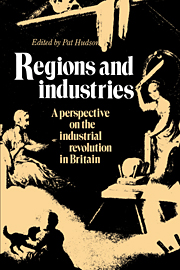Book contents
Summary
There is growing dissatisfaction with studies at aggregate national level which attempt causal analysis, be they of demographic, social or economic phenomena. These sorts of studies have recently been prominent in reassessing the nature and importance of the industrial revolution in Britain emphasising gradualism and continuity and playing down the possibility of major discontinuity in either economic or social life. Much valuable research of the last decade or so has rightly corrected an earlier tendency to exaggerate the discontinuities of the period c. 1750–1850. But should the averaging out of changing experiences in different parts of Britain and the formation of an aggregate picture of components which happen to figure in the national income estimation persuade us that no discontinuity was present? Concern with change and progress may now be out of fashion: ‘British historians today are mainly concerned to show that less happened, less dramatically, than was once thought.’ But there are problems in viewing history in terms of ‘great arches’ of continuity or, as with much economic history, confining analysis to the ‘economic’ aspects of life as isolated by neo-classical economics. Both fail to capture that variety of experience and motivation which makes up the whole and neglect the significant transformations going on just under the surface of national economic indicators and national social groupings.
- Type
- Chapter
- Information
- Regions and IndustriesA Perspective on the Industrial Revolution in Britain, pp. 1 - 4Publisher: Cambridge University PressPrint publication year: 1989

